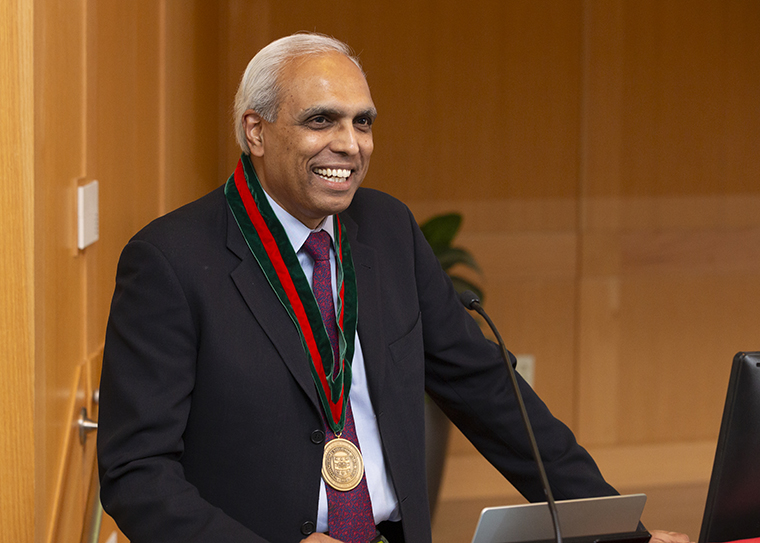
Rohit V. Pappu, an internationally renowned researcher in biomolecular condensates and intrinsically disordered proteins, was installed Oct. 9 as the Gene K. Beare Distinguished Professor of Biomedical Engineering at Washington University in St. Louis.
Pappu is a professor of biomedical engineering and director of the Center for Biomolecular Condensates at the McKelvey School of Engineering, a member of the Hope Center for Neurological Disorders at the School of Medicine, and a member of the interdisciplinary Roy and Diana Vagelos Division of Biology & Biomedical Sciences.
Pappu's research focuses on the form, functions and phase transitions of intrinsically disordered proteins and multivalent macromolecules. His work - which is driven by a combination of polymer physics theories, computational biophysics, machine learning and biochemical experiments in vitro and in living cells - is aimed at understanding how molecular matter is organized in space and time within cells. These foundational studies have a direct impact on the mechanisms that underlie the onset of neurodegeneration and the processes that enable cell proliferation in cancer. Specifically, he focuses on neurodegenerative diseases, including Huntington's disease and amyotrophic lateral sclerosis.
Prior to joining Washington University in 2001, Pappu completed postdoctoral research at Johns Hopkins University School of Medicine and at Washington University School of Medicine. He earned a doctorate in biological physics and a master's degree in solid state physics and biological physics, all from Tufts University, and bachelor's degrees in physics, mathematics and electronics from St. Joseph's College at Bangalore University in Bangalore, India.
Gene K. Beare, an executive and director of numerous high-profile companies in the electronics, telecommunications, defense, paper manufacturing and other fields, who was also a benefactor to many charitable, cultural, scientific and educational organizations and institutions, made a commitment in 1998 to establish this professorship. Born in Chester, Ill., Beare worked his way through WashU and earned a bachelor's degree in mechanical engineering in 1937.






